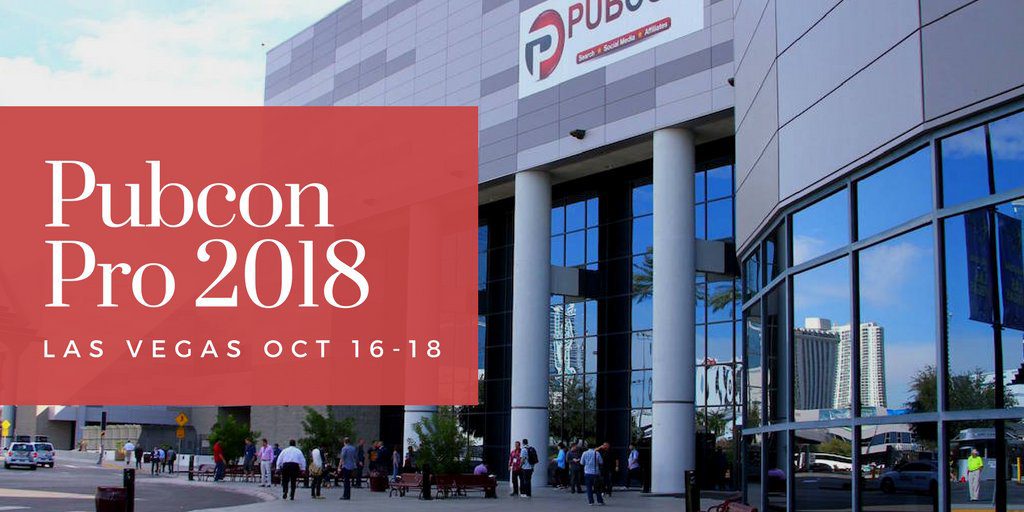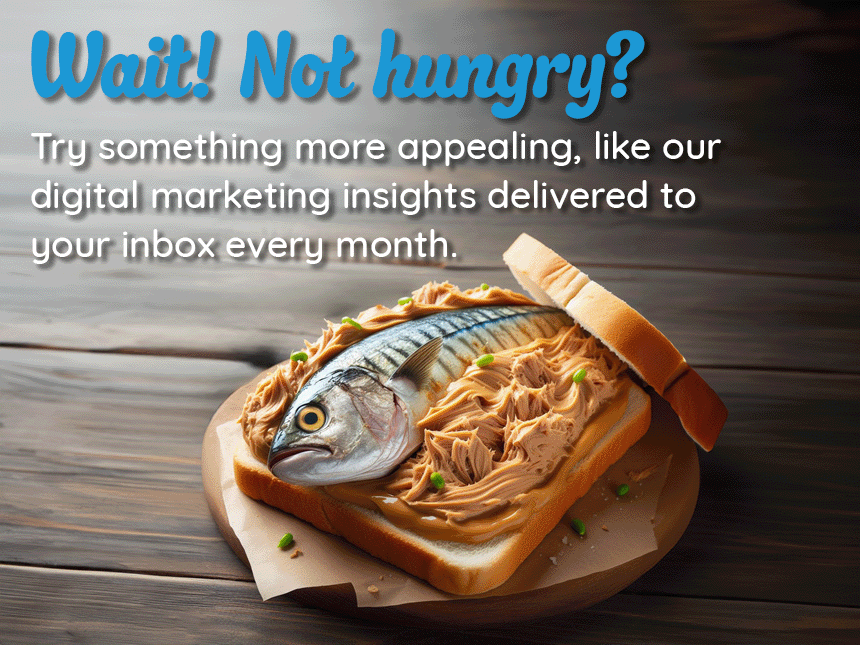4 Key Takeaways from Pubcon Pro 2018
 Image Source: Twitter
Image Source: Twitter
In its eighteenth year, Pubcon Las Vegas (now Pubcon Pro) has changed to match the marketing landscape that it represents. Modern SEO and digital marketing practices are significantly more sophisticated than they were at Pubcon’s inception, and this year’s conference mirrored this evolution accordingly.
As the digital marketing landscape changes, Pubcon has, in a sense, grown up. Local Search, Mobile Search, Content Marketing, and Social Marketing are all accepted avenues common to most business marketing mixes. What used to be a haven for “secret sauce” digital tactics is now part of an increasingly normalized space. It’s no longer the scrappy industry in which I started my career, which is a good thing.
With the Mobile-first rollout in the rearview and Voice Search a known commodity, let’s examine what’s on the minds of digital marketers as we look at the top takeaways from Pubcon Pro 2018.
Takeaway #1: Search Marketing Is Regular Marketing Now
 Image Source: Pixabay
Image Source: Pixabay
As I poured through Pubcon presentations, the most striking realization was how ho-hum many topics were. I’m not dismissing content nor substance; it seems that the buzzworthy topics of the past – Local, Mobile, Content, and Voice-based Marketing – are now just assumed commodities.
In a sense, we’ve made it. Search and its related sphere of disciplines are now every day, commonplace marketing.
Several presentations make this clear. Debra Jasper, founder of Mindset Digital, gave a spirited keynote (“You Have 8 Seconds – GO!“) that discussed the importance of quickly getting your message across in an increasingly distracted world. Michelle Morgan, Director of Client Services for Clix, discussed Targeting Users at All Stages of the Buyer Funnel. Keith Goode, SEO Manager, Security Intelligence at IBM, talked about Enterprise Team Building. And Roger Dooley, Forbes contributor and author of Brainfluence, covered reducing consumer friction to motivate action and increase brand loyalty.
All of these topics exist outside the realm of digital marketing, and these would be welcome guest lectures in any undergraduate marketing class. It looks like digital marketing has finally taken its rightful place alongside its traditional print, radio, and television counterparts.
Takeaway #2: Technical SEO Means Everything (Again)
 Image Source: Pixabay
Image Source: Pixabay
Digital marketing was able to evolve because it was built on a firm foundation. That foundation is smart technical development. In the late nineties and early aughts, SEO was largely a technical discipline populated by web developers; Content SEO wasn’t really a mainstream practice until the mid to late 2000s.
That coders were a major part of SEO’s development is precisely what makes it so strong. We sometimes lose site of that in the face of flashier, easier to digest areas like Social and Content Marketing. But old is new again, and it’s no surprise that cross-device marketing, Voice Search, and machine learning have resulted in the industry doubling down on its Technical SEO roots.
Aside from an exhaustive list of new tools for SEO audits (which you should absolutely check out), there’s very little in SEO mainstay Bill Hartzer’s Advanced SEO Audits deck that couldn’t have been shared five years ago; sound process remains key to technical SEO compliance. Rob Woods went in depth on the importance of internal linking and URL structure, which is sure to generate more than a few new Screaming Frog subscriptions. And Ann Smarty, Brand & Community Manager at Internet Marketing Ninjas, walked through how to optimize for Google’s Featured Snippets, taking a technical approach to content structuring in order to target that high click-through Google real estate.
None of these presentations are particularly earth shattering or present anything truly “new,” but they are absolutely vital to proper SEO in an increasingly complex digital landscape.
Takeaway #3: SEO Is Global
 Image Source: Pixabay
Image Source: Pixabay
International SEO was also at the forefront of Pubcon Pro this year, and for good reason. If you’ve never dealt with tackling multiple countries (and their relevant Search Engines) and languages, creating the proper basis for targeting can prove challenging.
Aleyda Solís, Founder of Orainti, gave an excellent presentation on developing a successful international SEO process – emphasizing the importance of quantifying international market priorities, building a sustainable web structure, and properly geolocating each countries’ respective content offerings. She also went into greater detail on setting up HREFLANG tagging for proper parsing in different language versions of Search Engines.
GDPR compliance was at the forefront of the International marketing discussion at Pubcon Pro. Scott Hendison’s Avoiding the 7 Deadly Sins of GDPR Non-Compliance presentation did a stellar job of presenting the reasons for complying with GDPR (even for U.S.-based businesses), how to comply, and the consequences of noncompliance. I consider this deck essential reading material for all marketers.
Takeaway #4: The Robots Would Like a Word with You
 Image Source: Scified
Image Source: Scified
The robot revolution is here, and they are manning our customer services desk. Purna Virji, senior manager of global engagement at Microsoft, led a rousing Main Stage discussion on voice assistants and chatbots. With Hubspot Conversations offering its own easy-to-use chatbot builder, conversational AI solutions have been picking up steam with marketing clients in line with their growing sophistication (both of chatbots and of savvy clients).
Virji notes, however, that there’s still more to be done in this space. She explains that chatbot abandonment rates are high due to poor user interactions, creating bad first impressions of the brand.
Virji goes on to relay how AI can provide a better customer experience by focusing on clarity, character, and testing. Bots should provide choices and then ask a question after listing said choices, which can streamline communication for a frictionless interaction. They should be made with engaging and human-like personas but shouldn’t try to trick users into thinking they’re chatting or talking to an actual person. And there should be guidelines and alternatives in place for when the AI experiences an error, since the “sorry, I don’t understand” response inevitably kills the conversation.
It will be interesting to see how AI-based customer service advances over the next few years, but I don’t think we need to fear the robot uprising just yet.
SEO Won Its Seat at the Table
 Image Source: Feededigno
Image Source: Feededigno
My Arc Intermedia colleague Patrick Coyne and I often browse the latest Search industry news and, with each new development, ask each other: “Does this really change our clients’ approach?” As we kicked the tires on things like Google reverting its Meta Description character limit or the new format for Google Sitelinks, we frequently find that the answer is no, not significantly.
There’s a reason for this. We’re not really SEOs. We’re marketing professionals that happen to specialize in SEO. And when you focus on strong, consistent marketing, many of the day-to-day changes in the Search landscape become trivial.
For example, we had no fear of Google’s Mobile-first indexing switch-up, because Mobile has always been important to our marketing efforts. That’s why Arc Intermedia was an early adopter of responsive design web development in the first place. Marketing is a holistic exercise that works best with all tactics in alignment.
Pubcon Pro 2018 demonstrates this reality. It depicts an industry that recognizes Search as a component of marketing, rather than some high-tech game to win top Search Results. Search is traditional marketing now, a distinction proven through efficacy and sophistication. We’ve earned our seat at the table.



